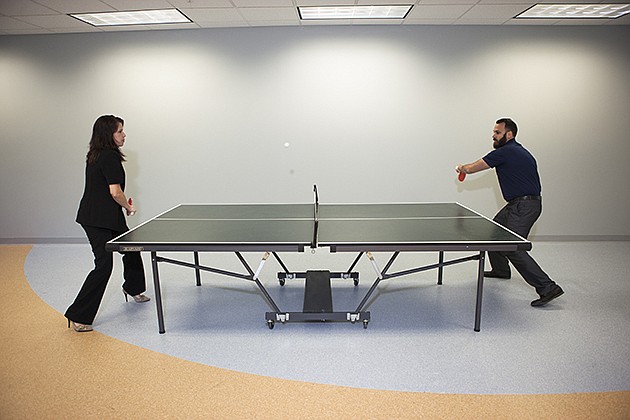- November 25, 2024
-
-
Loading

Loading

Executive Summary
Company. TriNet Industry. Human resources Key. Company plans to overhaul its office space, to make it more collaborative.
Joe Bush wants to bring a little bit of Chicago to east Manatee County.
Not pizza or hot dogs. But a futuristic office, where salespeople collaborate naturally, call center employees aren't crammed into each other's workspace and a massage is only an elevator ride away. The Windy City part comes from an inspiring trip Bush, a Florida executive for TriNet, a San Leandro, Calif.-based human resources outsourcing firm and professional employer organization, took last year. In Chicago, Bush toured 1871, a popular hub for digital startups. “That's where I said, 'Wow, this is the future of how people want to work,'” he says.
Bush is point man for a major overhaul of TriNet's 90,000-square-foot campus in east Manatee County's sprawling Lakewood Ranch. The TriNet project, which began earlier this year and is scheduled to last at least until mid-2017, will cost more than $1.2 million.
The primary goals of the overhaul: to improve productivity and enhance collaboration, with a concentration on making the company a place millennials want to work. “Cubicles are the fax machine,” says Bush. “What we are building is like the cloud of office space.”

 The project also has the potential to transform the office of one of the largest private employers in Manatee County. TriNet has around 520 employees in Lakewood Ranch, says Bush, which is about 25% of the entire company. The bulk of the jobs are phone-based sales and customer service. Clients are mostly midsize businesses, from nursery farms and architects to life sciences and entertainment companies. One client, the company says, is Costa Mesa, Calif.-based Ultra Mobile, the No. 1 fastest-growing company on the 2015 Inc. 500.
The project also has the potential to transform the office of one of the largest private employers in Manatee County. TriNet has around 520 employees in Lakewood Ranch, says Bush, which is about 25% of the entire company. The bulk of the jobs are phone-based sales and customer service. Clients are mostly midsize businesses, from nursery farms and architects to life sciences and entertainment companies. One client, the company says, is Costa Mesa, Calif.-based Ultra Mobile, the No. 1 fastest-growing company on the 2015 Inc. 500.
Bush seeks to break up the monotony with some funky office features. The list includes an espresso and yogurt bar named TriNet Fuel; a game room with life-size Connect Four, Jenga, foosball and other games; a Zen-room with massage chairs; and wall of inspiration, which Bush calls Ignite, that will have motivational sayings.
There are also changes designed to deal with the actual work. For that, Bush is all about the right use of space.
In some departments that means reconfiguring the desk layout. For example, one sales group will get a new floor of desks laid out in several snake-like formations instead of rows and columns. That idea, which Bush says the Tampa Bay Rays use in its ticket sales department, will make space for 200 desks where there used to be 164. “We want people to be interactive and collaborate, but not be on top of each other,” Bush says. “We want to get more efficient with our space and have more productivity.”
Other departments will get new desks and chairs, if not new layouts. Cubicle heights will be lowered and in some cases eliminated, says Bush, and chairs will be ergonomically correct. “The old way you felt like you were in a box,” Bush says. “It was hard to coach people. It had a real sterile feel.”
Big reach
TriNet is one of the largest professional employer organizations in the country, with $2.6 billion in sales in 2015.
Professional employer organizations, sometimes called employee-leasing firms, take on multiple management tasks for clients, including employee benefits, payroll and workers' compensation.
San Leandro, Calif.-based TriNet expanded to Manatee County in March 2009 when it bought Gevity, a competing PEO, for $98 million. Bradenton-area entrepreneur Bill Mullis, an early PEO pioneer, founded a predecessor company to Gevity in 1984, Staff Leasing. The company went public in 1997 and changed its name to Gevity in 2000. TriNet took over the space Gevity used in a Lakewood Ranch corporate park when it acquired the firm.
Burn through
The year 1871 carries major significance for Chicago: That's when a fire ripped through town and destroyed a chunk of the city, leading to a massive rebuilding project.
But four years ago a group of entrepreneurs and city economic development leaders turned the year into the name behind an experimental workspace for digital and tech startups. The hub, 1871, has since grown into a technology center that covers the 12th and 13th floors of The Merchandise Mart in Chicago's Near North Side neighborhood. The current version of 1871 occupies more than 100,000 square feet, has more than 400 member companies and hosts at least 1,000 events a year.
While the center has received national press, in addition to visits from dozens of global business icons and politicians, another key component is its hip and modern millennial-driven office layout.
Joe Bush, an executive with the Lakewood Ranch office of TriNet, a human resources outsourcing firm, took a tour of 1871 last year. TriNet has done renovations with shared workspace leader WeWork for other offices. But Bush says the 1871 layout was the most impressive office he's seen, especially in terms of inspiring collaboration among employees. Bush plans to incorporate pieces of 1871 into a $1.2 million renovation of TriNet.
Basic components of 1871 include open seating, large picnic-like tables for group meals and specially designed private lounges. Other features include: A curved wall designed to look like the Chicago River; multiple large murals from local artists; an eclectic mix of antique-like and vintage furniture; and tubular ceiling lights. The office has won several design and coolest spaces awards from Chicago-area business publications.





